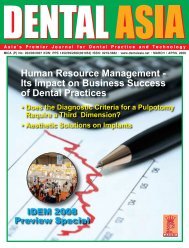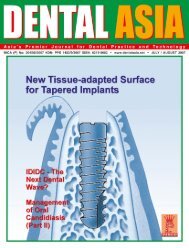Download - Dental Asia
Download - Dental Asia
Download - Dental Asia
Create successful ePaper yourself
Turn your PDF publications into a flip-book with our unique Google optimized e-Paper software.
CLINICALFEATURE<br />
physician’s recommendation, available facilities, dentist<br />
expertise, and patient’s oral, medical, and general condition.<br />
(Scully C 2002)<br />
Contraindications<br />
The following are contraindicated:<br />
Aspirin should be avoided by those known to be allergic to<br />
NSAIDs. Nonsteroid anti-inflammatory drugs (NSAID)<br />
crossreact with aspirin in aspirin-sensitive patients and vice<br />
versa (Settipane GA. 1998). Caution should be exercised in<br />
those with asthma or NSAID-precipitated bronchospasm due to<br />
the inhibition of COX in airways of the sensitive patients<br />
.patients with peptic ulcers are also encouraged to avoid<br />
aspirin. Children, including teenagers, are discouraged from<br />
using aspirin in cold or flu symptoms as this has been linked<br />
with Reye’s syndrome (MacDonald S 2002). Patients with other<br />
bleeding tendencies are also recommended to avoid aspirin.<br />
Aspirin-Induced Asthma, (AIA) has been reported. The<br />
frequency among asthmatics is around 8%-20%. Aspirin blocks<br />
the enzyme cyclooxygenase and this reduces the synthesis of<br />
prostaglandins. A further potential result of this blockade<br />
however is to shunt the cascade of reactions into a leukotriene<br />
pathway and leukotrienes are known to induce<br />
bronchoconstriction. Other theories are based on AIA patients<br />
having abnormal platelets, having abnormal thromboxane/<br />
prostaglandin ratios in the lung or even having had a chronic<br />
viral infection.<br />
NSAIDs (including COX II), is the acronym for Non-Steroidal<br />
Anti-Inflammatory Drugs. They are peripherally-acting antipyretic<br />
analgesic anti-inflammatory drug.<br />
The latest addition are the COX II inhibitors, introduced in<br />
1998. It acts via the inhibition of the enzyme cyclooxygenase<br />
which in turn reduces the level of prostaglandins in the body.<br />
Therefore, it is a peripherally-acting antipyretic analgesic anti<br />
inflammatory drug. Likewise, it has weak anti-thrombotic effect,<br />
being a weak inhibitor of platelet aggregation. It is also safer on<br />
the stomach than aspirin . Cyclooxygenase, is an enzyme that<br />
occurs in at least two isoforms:<br />
1) COX1 (constitutive), which mediates formation of<br />
prostaglandins responsible for GI mucosal protection,<br />
hemostasis and renal blood flow.<br />
2) COX2 (inducible), which catalyzes production of<br />
prostaglandins that act as inflammatory mediators. The<br />
enzyme can play a homeostatic role in some situations<br />
(ulcer healing, maintenance of renal blood flow during<br />
stress, prostacyclin production).In general NSAID’s that<br />
inhibit COX2>COX1 are considered the drugs of choice in<br />
this class.<br />
The following are some common NSAIDs<br />
1. Diclofenac<br />
There is no clear evidence that<br />
taking paracetamol causes<br />
asthma, but more studies are<br />
suggesting that may be some<br />
association<br />
2. Diflunisal<br />
3. Etodolac<br />
4. Fenoprofen<br />
5. Floctafenine<br />
6. Flurbiprofen<br />
7. Ibuprofen<br />
8. Indomethacin<br />
9. Ketoprofen<br />
10. Meclofenamate<br />
11. Mefenamic Acid<br />
12. Meloxicam<br />
13. Nabumetone<br />
14. Naproxen<br />
15. Oxaprozin<br />
16. Phenylbutazone<br />
17. Piroxicam<br />
18. Sulindac<br />
19. Tenoxicam<br />
20. Tiaprofenic Acid<br />
21. Tolmetin<br />
The COX II Inhibitors include the following:<br />
1. Celecoxib Celebrex®<br />
2. Rofecoxib Vioxx®*<br />
3. Valdecoxib Bextra*<br />
4. Etoricoxib Arcoxia<br />
* withdrawn from market<br />
The drugs are recommended for use on patients with allergic<br />
reaction to aspirin or has had urticaria, rhinitis or asthma<br />
associated with NSAIDs .NSAID’s should be avoided in the<br />
presence of renal or hepatic dysfunction, coagulopathies, GI<br />
disorders, shock, hypotension/hypovolemia, hypoalbuminemia<br />
or pregnancy.<br />
In the Vioxx Gastrointestinal Outcomes Research (VIGOR)<br />
trial, there was a higher incidence of cardiovascular thrombotic<br />
events in the rofecoxib vs the naproxen-treated group: 1.67 vs<br />
0.70 per 100 patient years. (Konstam 2002)<br />
In a comprehensive analysis of 114 randomized trials with<br />
116,094 participants, rofecoxib was associated with increased<br />
<strong>Dental</strong> <strong>Asia</strong> • May / June 2008<br />
41





